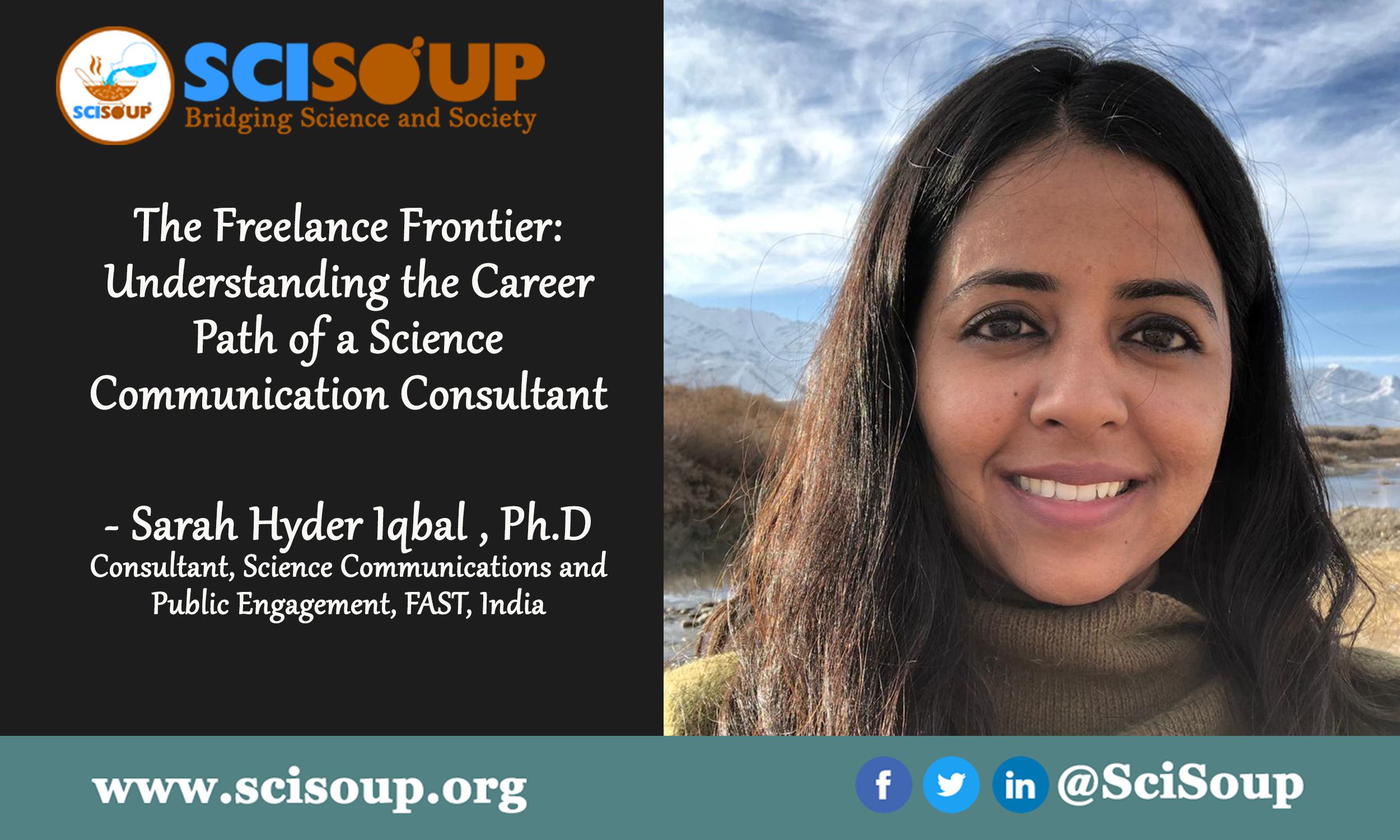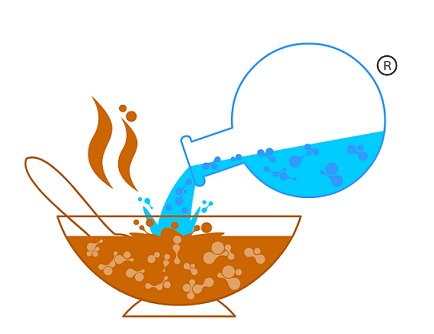
"Changing career paths can be daunting and often challenging, so enter the field with the right motivations and an open mind that’s willing to learn and unlearn."
MAY 28, 2023 | BY DIVYA P. KUMAR AND RATNESHWAR THAKUR
In this 2023 edition of SciSoup's Career Development and Mentoring Blog Series, we are delighted to feature Dr. Sarah Hyder Iqbal, a consultant at the non-profit Foundation for Advancing Science and Technology (FAST India). In this SciSoup blog, Dr. Iqbal shares her valuable insights and experiences of Science Communications and Public Engagement with the SciSoup community.
Beyond her role as a consultant, Dr. Iqbal is also a Co-Founder and co-leads the activities of Superheroes Against Superbugs (SaS), a remarkable public engagement initiative. Additionally, she is involved in a multi-country research project commissioned by the Wellcome Trust UK, serves as a faculty member in Sangath's Health Communication course, and regularly contributes as a reviewer for funding and project proposals pertaining to public engagement by various global research funders.
1) Could you briefly introduce yourself to the audience?
I trained as a researcher in the life sciences and have since pivoted my career towards science engagement. I am presently involved in several projects that are focused on enhancing capacity, funding, research, and overall best practices within the field of public engagement with science.
Following my Masters and PhD in Biochemistry from the University of Oxford, UK, and postdoctoral research at The Scripps Research Institute, Florida, USA, I joined the Indian research funding agency, DBT/Wellcome Trust India Alliance (India Alliance), as their first Communications and Public Engagement Lead and worked there from late 2014 until early 2021.
When not racking my brains on and dabbling with creative and participatory tools and approaches for public and policy engagement with science, I like to sing, geek out on music from Hindustani classical to jazz to Indian film music, enjoy playing (not watching) sports, experiment with gardening, and binge watch OTT series whenever I get a chance.
2) Describe your responsibilities in the current position that you hold.
I am currently working as a consultant with the non-profit Foundation for Advancing Science and Technology (FAST India) in New Delhi in their Science Communication vertical, where we are exploring ways to build capacity and institutionalize science communication in India, along with promoting innovative ways of taking science to the public. I am also co-leading the activities of Superheroes Against Superbugs (SaS), a public engagement initiative I co-founded in 2018. At SaS, we organize a diverse range of events and workshops to promote public awareness and action to address the urgent public health issue of Antimicrobial Resistance or AMR. I am also presently part of a really exciting multi-country research project commissioned by the Wellcome Trust UK, which aims to understand how the public and communities can play a more meaningful, inclusive, and reciprocal role in the research ecosystems, particularly in LMICs. Additionally, I am one of the faculties of Sangath’s Health Communication course and regularly serve as a reviewer for funding and project proposals on public engagement of various global research funders.
3) How has your educational background helped in pursuing your current career?
The training I received in research has been absolutely invaluable. I am also able to say this because I was fortunate to have an amazing PhD supervisor and lab mates. Apart from learning the rigors of scientific research, the training also instilled in me a diverse range of transferable skills and vital life lessons that have so far proven immensely useful in both my professional and personal lives.
However, it is important to acknowledge that these skills are not always apparent to us, and unlike academia, they are highly valued in non-academic sectors. The ability to think analytically, manage projects, troubleshoot effectively, maintain records, develop and foster collaborations, and mentor peers and junior colleagues are some of the crucial skills that researchers acquire but rarely recognize.
Furthermore, research is a challenging yet rewarding field that prepares you to be patient and resilient. It teaches you how to deal with both success and failure, much more of the latter than the former. I vividly remember spending an entire year during my graduate training trying unsuccessfully to clone a plasmid, only to have to abandon the project eventually. Sometimes, finding solutions to problems can be elusive, and one must persevere through such setbacks, as there’s no dearth of questions and problems out there that need to be solved.
I should also mention here that, coming from a privileged background, I did not view science as the only means to make a living. Rather, I saw it as a tool to learn and experience new things and to use that knowledge for sense making, to navigate life's complexities, and to solve problems to the extent it allows us to.
4) What are the additional training(s) required or that you had to take up to fit yourself to the current profession?
Although I have not undergone any formal training in science engagement, my exposure to various workshops, conferences, and on-the-job learning opportunities has been instrumental in developing my skills and understanding of the field. I have also enrolled in short courses on participatory practices, which have enabled me to approach public engagement in a more meaningful and effective manner.
Furthermore, collaborating with Indian and international experts on various projects has been a tremendous source of inspiration and learning for me. While I have been fortunate to work with many inspiring people, I would like to particularly acknowledge Banalata Sen, Subhra Priyadarshini, Sara Kenny, Nabeel Petersen, and Pradeep Narayanan, a few wonderful folks who have played a vital role in shaping my perspective on science communication and public engagement by selflessly sharing their knowledge and expertise with a novice.
For this reason, I would strongly encourage aspiring science engagers and communicators to not only proactively carve out their niche in the field but also seek out mentors and individuals who can add value to their understanding and approach to science engagement, while simultaneously staying abreast of the latest developments and trends in the field through social media, workshops, and meetings/conferences. Sometimes these relationships open doors, in both your mind and career that are not immediately apparent.
5) What made you walk down a less-explored path of science communication and engagement?
I didn't have an epiphany that sparked my interest in science engagement. It was a slow process of discovery and understanding through my PhD and postdoctoral training periods.
Having said that, it was really during my postdoctoral stint at Scripps Research Institute, Florida, that I realized the inevitability of science’s interface with society and its importance, as well as how this engagement is in fact mutually beneficial.
So here I was at a scientific institution that was founded by a journalist and philanthropist, Ellen Browning Scripps, and the Florida campus was opened by Governor Jeff Bush in the early 2000s with the hope that it’d generate jobs and IP in a state mostly known for Disney World. The institute and the research there were also in large part funded by philanthropists who had nothing to do with science but believed in its power to improve lives. I also used to regularly meet philanthropists to tell them about why our research matters and participate in science outreach to the local community to help them understand why, among the palm trees, tiki bars, and beaches, there’s a research institute doing cutting-edge research in neuroscience, diabetes, and infectious diseases. It was really through this collection of experiences that I started to wonder about public engagement with science and its potential in my wildly diverse and complex home country, India.
6) You have worked as a consultant at different workplaces. Could you please explain this career path to our audience and what it demands?
If someone had told me that freelancing in science engagement was a viable career option in India around seven years ago, I might have found it hard to contain my amusement. However, in recent times, the number of consultants and freelancers working in this field has increased significantly, which is extremely encouraging. Nevertheless, it is my sincere wish that this profession continued to offer substantial financial rewards to those who pursue it as a career path.
While being a freelancer or consultant gives you a lot of freedom to choose the kind of work you want to do, you also need to plan very well if you want to have a constant stream of income. Because, at least for me, my work in science engagement is not a hobby; it’s my livelihood. I am too new to this professional avatar to be able to impart fully formed wisdom, but here are a few things I have learned along the way.
As a freelancer or consultant, you should be able to manage your time effectively to meet project deadlines because, most of the time, you'll be working on multiple projects. Additionally, being adaptable and flexible is important, as each project, person, and organization you work with is unique, and you may need to adjust your approach and sensibilities accordingly.
7) What are the challenges that exist in building capacities for science engagement in India?
I guess the biggest challenge is mindset on various levels – scientific community, decision makers, and even science engagers or communicators. I feel we still haven’t accepted science engagement as a serious professional field and often see it as a hobby, a side interest. While science engagement or communication has become a buzzword lately, I don’t really see any serious thought given to what it entails beyond perhaps popular science writing and school engagement. Despite the growing popularity of science engagement, the true essence of this field is yet to be fully realized, at least in India. There is a dire need for a concerted effort to professionalize this field so that its practitioners can explore and develop it at par with other science and science communication faring nations.
To be able to unlock the full potential of science engagement, it requires consistent, if not significant, investments in this field in our country. But more importantly, it can help make scientific research and innovation more people-centered and, as a result, more relevant and impactful.
8) If you were asked to provide 3- tips/ guidance to aspirants who would like to follow a similar career path, what would you suggest?
Think outside the box, challenge the status quo, and be kind. There’s no right or wrong way to do this; do it your way. Furthermore, changing career paths can be daunting and often challenging, so enter the field with the right motivations and an open mind that’s willing to learn and unlearn.
Disclaimer - SciSoup claims no competing interest. The opinions expressed by participants in this blog are solely their own and do not necessarily reflect the views or opinions of the blog creators or its affiliates. The purpose of this blog series is to raise awareness about non-academic careers and provide mentoring insights.

Send your opinions, questions, and suggestions for future column topics and stories - to scisoup@gmail.com and engage with us on